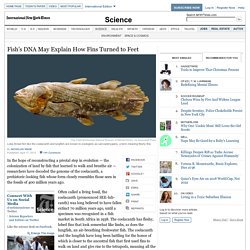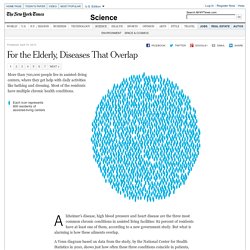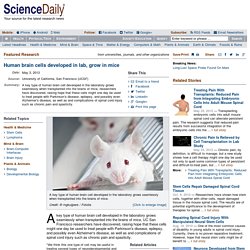

Students' petition calls on FDA to change ban on gay blood donors. "A rancid, corrupt way to report about science" Justices Mull Patents on Human Genes - NYTimes.com. “Why should we jump in and decide the broadest possible question?”

Asked Justice Samuel A. Men might want to shun fish oils, study shows. Originally published July 10, 2013 at 9:08 PM | Page modified July 11, 2013 at 3:07 PM Taking fish-oil supplements or even eating too much fatty fish may be linked to an increased risk for prostate cancer, according to a new study from the Fred Hutchinson Cancer Research Center.

The result confirms findings from an earlier study by the same team, but they are puzzling, given fish oil’s supposed anti-inflammatory effect, which would protect against cancer. Researchers could not offer a biological reason for the link, and called for more study. The study analyzed levels of omega-3 fatty acids — the type of oil found in some fish — in the blood of 834 men who developed prostate cancer race- and age-matched with 1,393 men who did not. Men who had the highest levels of omega-3 fatty acids had a 43 percent increase in risk for prostate cancer and 71 percent increase in risk for the high-grade prostate cancer that is the most likely to be fatal. Getting Men to Want to Use Condoms - NYTimes.com. Epilepsy cured in mice using brain cells. Epilepsy that does not respond to drugs can be halted in adult mice by transplanting a specific type of cell into the brain, UC San Francisco researchers have discovered, raising hope that a similar treatment might work in severe forms of human epilepsy.

UCSF scientists controlled seizures in epileptic mice with a one-time transplantation of medial ganglionic eminence (MGE) cells, which inhibit signaling in overactive nerve circuits, into the hippocampus, a brain region associated with seizures, as well as with learning and memory. Other researchers had previously used different cell types in rodent cell transplantation experiments and failed to stop seizures. Cell therapy has become an active focus of epilepsy research, in part because current medications, even when effective, only control symptoms and not underlying causes of the disease, according to Scott C. Fish’s DNA May Explain How Fins Turned Into Feet - NYTimes.com.
Chip Clark/Smithsonian National Museum of Natural History, via Associated Press.

Drug Makers Use Safety Rule to Block Generics - NYTimes.com. Some within the industry have been forthright about how these drug safety programs can be turned to a company’s advantage.

At a conference in 2010, one speaker delivered a presentation that listed “life cycle management options” as one benefit of such safety programs. “Life cycle management” is industry jargon for maximizing the length of a brand’s patent life. Representative Henry A. Waxman, Democrat of California, said Congress needed to remove the loophole that allows branded drug makers to deny generic manufacturers access to their products. “The purpose of these postmarket safety plans was to protect consumers from risky drugs, not to allow brand companies to thwart generic competition,” said Mr.
But legislative efforts to require drug makers to sell samples to generic companies have failed twice, once during passage of the 2007 law, and last summer, when Congress reauthorized a user-fee program for drugs and medical devices. Futurity.org – Given time, stem cells may mutate. U.

MELBOURNE (AUS) / U. SHEFFIELD (UK) — A new study reveals how the genome of 138 stem cell lines of diverse ethnic backgrounds changed when the cells were grown in the laboratory. Martin Pera, co-author of the paper and chair of stem cell science at the University of Melbourne, says the work “shows clearly that during prolonged culture, stem cells can acquire genetic changes similar to those seen in human cancers. “While it is reassuring that 75 percent of the stem cell lines studied remained normal after prolonged growth in the laboratory, detecting and eliminating abnormal cells is an absolute prerequisite for clinical use of stem cell products,” he adds. Human pluripotent stem cells show promise as a source of cells for regenerative medicine.
However, scientists are concerned that over time the cells can acquire genetic mutations, which may compromise their usefulness for cell therapy. Futurity.org – Fast and cheap: Chip cranks out DNA. DUKE (US) — Bioengineers have designed a 1-by-3 inch chip that can produce custom-made segments of DNA in two days.

Current methods take two weeks and require large equipment and significant human labor. Creating and copying novel pieces of DNA quickly and inexpensively could have broad implications in the production and screening of new drugs, as well as replacing current technologies for genetic cloning, the researchers say. DNA is the genetic material—or software—in all living things that acts as a blueprint for the production of proteins, the building blocks of life. An improved ability to create and test these protein-producing molecules could be a boon to the new field of synthetic biology, where scientists design new genes to produce novel proteins, which can be used in such fields as medicine and environmental monitoring. The results of the experiments were published in the journal Nature Biotechnology. Using DNA to Store Digital Information - NYTimes.com. F.D.A. Bars Generic OxyContin - NYTimes.com. Stuart Isett for The New York Times The F.D.A.'

Futurity.org – To harness HIV, make it get ‘naked’ Overlapping Health Worries for the Elderly - NYTimes.com. Alzheimer’s disease, high blood pressure and heart disease are the three most common chronic conditions in assisted living facilities: 82 percent of residents have at least one of them, according to a new government study.

But what is alarming is how these ailments overlap. Human brain cells developed in lab, grow in mice. A key type of human brain cell developed in the laboratory grows seamlessly when transplanted into the brains of mice, UC San Francisco researchers have discovered, raising hope that these cells might one day be used to treat people with Parkinson's disease, epilepsy, and possibly even Alzheimer's disease, as well as and complications of spinal cord injury such as chronic pain and spasticity.

With Epilepsy Treatment, The Goal Is To Keep Kids Seizure-Free : Shots - Health News : NPR.